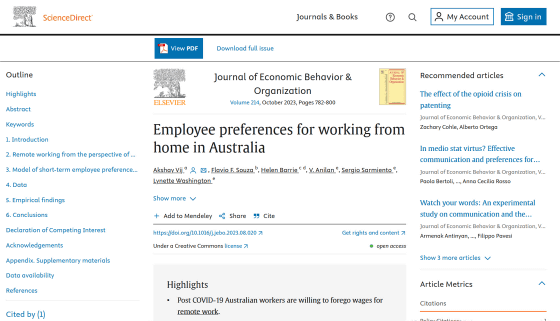Survey results show that approximately 20% of workers would be willing to take a 30% cut in their salary if they could work from home, but more than half would choose to work if their salary were to be reduced.

In recent years, remote work has become popular in various companies and occupations, and many people who have experienced remote work may feel that they can't return to working in an office or on-site. A study conducted in Australia found that around 20% of workers would be willing to lose 16-33% of their salary if they could continue working remotely.
Employee preferences for working from home in Australia - ScienceDirect

What's it worth to work from home? For some, it's as much as one-third of their wage
https://theconversation.com/whats-it-worth-to-work-from-home-for-some-its-as-much-as-one-third-of-their-wage-217554
The proportion of workers working from home in Australia's major cities ranged from 2% to 8% on the day of the 2016 census. However, during the lockdown in late 2020, around 31% were working from home, and on the day of the 2021 census, 21% were still working from home. This shows that remote work has become widespread during the pandemic.
A research team led by Lynette Washington , a research fellow at the University of South Australia's School of Management, surveyed 1,113 workers in 17 Australian cities who work remotely or in an office. We investigated how much of a pay cut they would accept.
The survey included subjects' industry and annual income, ability to complete tasks remotely, changes in commuting patterns before and after the pandemic, salary range that they can afford to lose in exchange for remote work, attitude towards remote work, age and gender. surveyed demographic information. Regarding the salary range that would be cut in compensation for remote work, subjects were provided with multiple work styles and salary options calculated based on their current salary, and asked to choose which one they preferred. .

After analyzing the survey results, 55% of workers completely refused to sacrifice salary in exchange for remote work. Of these, 31% of workers did not see significant benefits to working from home in the first place, while 24% of workers saw the productivity, health and wellbeing benefits of working from home, but I chose to work in an office because I was concerned about the impact it would have on interpersonal relationships and promotions.
The research team points out that ``workers who had the most experience working from home before the pandemic were the most likely to be concerned about the negative effects of working from home.'' These people may have experienced first-hand the disadvantages of working from home because policies and procedures to support remote workers were not in place before the pandemic.
On the other hand, approximately 25% of workers would be willing to lose 2,000 to 4,000 Australian dollars (approximately 200,000 to 400,000 yen: 3 to 5% of their annual income) of their salary if they could work from home; % of workers said they would be willing to lose 12,000 to 24,000 Australian dollars (approximately 1.2 to 2.4 million yen: 16 to 33% of their annual income). We found that these workers who prefer remote work are most likely middle- to high-income office workers and professionals, while lower-income workers and retail workers are the least likely to value working from home.
Additionally, women overall tend to place more importance on working from home than men, and by age, those in their 30s and 50s rate working from home the most highly, while those in their 20s place the lowest importance on working from home. It turns out. This may be because young people at the beginning of their careers are more likely to value direct interaction with colleagues and superiors.

Washington and colleagues' findings suggest that employers in knowledge-intensive professions, such as the health and financial sectors, may be able to attract high-quality workers by offering the option of working from home in exchange for a higher salary. It is claimed that there is. However, he noted that many workers do not see value in remote work, so it is not an option for all employers.
Related Posts:
in Science, Posted by log1h_ik







